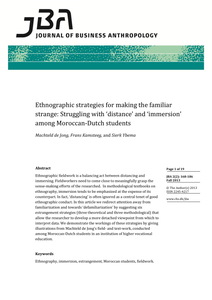In this paper, I explored how to research a sensitive topic such as gossip in organizations and used a narrative approach to illustrate the methodological and ethical issues that come up when considering a variety of research methods. I first attempted to conduct an ethnographic research on a project group from a Dutch university undergoing a major change. At the very beginning of the project, as a participant observer, I struggled to remain an outsider, or a “fly on the wall.” But as issues of power came into play and access became increasingly problematic, I moved towards the role of an “observing participant.” Therefore, in order to research gossip and some of the hidden dimensions of organizational life, I turned to auto- and self-ethnography as a way to regain access and greater authenticity. While following this route presented its share of ethical and methodological issues, it also provided valuable insights that could be of value to researchers attempting to study sensitive topics such as gossip in organizations. https://nsuworks.nova.edu/tqr/vol23/iss7/18 LinkedIn: https://www.linkedin.com/in/dominiquedarmon/
MULTIFILE

Often research, education and professional practice are positioned as different activities. Researchers, students and professionals are defined in subject-object relations. For my Phd. thesis I applied another perspective. In dialogue with School Social Workers, Bachelor Social Work students during their internship, Vocational High School (VHS) Teachers and other involved actants I worked on activities to improve the financial health of VHS students. We explored in a relational spacial ethnography the roles of all above mentioned actants as learning professional and inquirer. During this long term project a mixed method participatory approach was applied. However in this ethnography these activities where integral part of developing of a whole set of interventions. It gave us the opportunity to develop new perspectives at developing interventions and learning in a relational dialogue
DOCUMENT

Ethnographic fieldwork is a balancing act between distancing and immersing. Fieldworkers need to come close to meaningfully grasp the sense-making efforts of the researched. In methodological textbooks on ethnography, immersion tends to be emphasized at the expense of its counterpart. In fact, ‘distancing’ is often ignored as a central tenet of good ethnographic conduct. In this article we redirect attention away from familiarization and towards ‘defamiliarization’ by suggesting six estrangement strategies (three theoretical and three methodological) that allow the researcher to develop a more detached viewpoint from which to interpret data. We demonstrate the workings of these strategies by giving illustrations from Machteld de Jong’s field- and text-work, conducted among Moroccan-Dutch students in an institution of higher vocational education.
DOCUMENT
